Key takeaways:
- Anti-war activism is deeply personal and driven by stories of individuals affected by conflict, highlighting the need for empathy and dialogue over militarization.
- Policy influence is critical for shaping laws and altering cultural attitudes toward war, emphasizing the power of personal narratives in advocacy.
- Grassroots movements effectively bring communities together, demonstrating the strength of collective action in driving change and influencing public policy.
- Building a lasting legacy involves empowering future generations of activists through mentorship and shared experiences, ensuring the anti-war message endures.
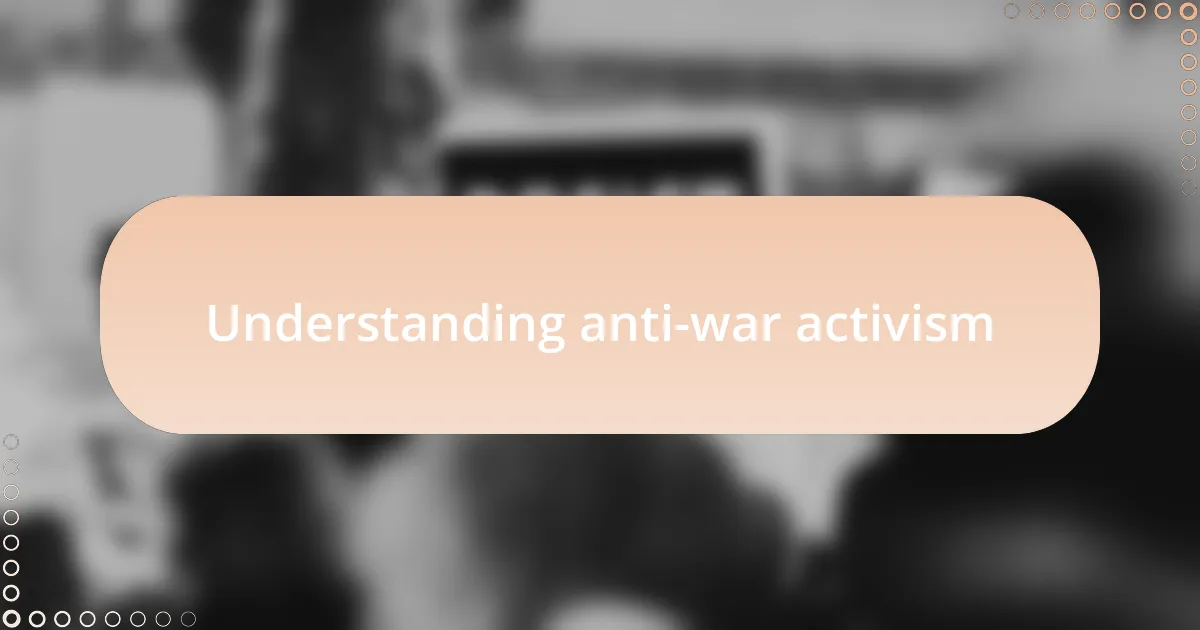
Understanding anti-war activism
Anti-war activism is rooted in a deep-seated belief in the value of human life and the devastating consequences of conflict. I remember attending a local rally years ago, where a veteran shared his painful experiences; his words echoed the harsh reality of war that many politicians often overlook. How can we, as a society, face the grim outcomes of militarization and yet persist in allowing such decisions to shape our future?
The movement is often fueled by the passionate outcry of those who have witnessed the aftermath of war firsthand. I once spoke with a mother who lost her son in a conflict. Her heartbreak was palpable, and it drove home the point that anti-war activism is not just political—it’s profoundly personal. What motivates us to take action is often the stories of individuals whose lives have been irrevocably changed by violence.
At its core, anti-war activism challenges us to think critically about the narratives we accept. I find myself questioning the justification for military action more than ever as I read stories of innocent lives affected by war. Isn’t it time we confront these uncomfortable realities and explore paths that prioritize peace over violence? That’s what this activism strives to achieve: a world where dialogue and empathy triumph over aggression and division.
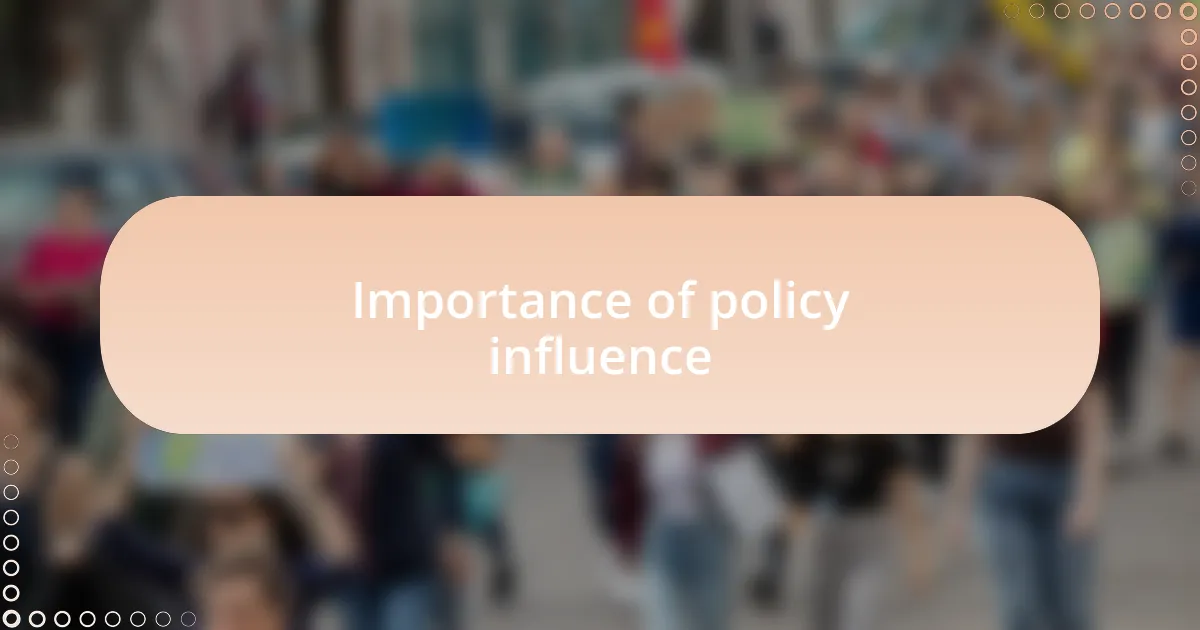
Importance of policy influence
Policy influence is essential because it shapes the laws and regulations that govern our societies, directly impacting how we respond to war and conflict. Reflecting on my experiences, I remember a moment when I mobilized a group to advocate for a congressional bill aimed at reducing military funding. Witnessing firsthand the shift in dialogue among policymakers was incredibly empowering; it made me realize how crucial advocacy is in steering discussions toward peace.
Moreover, the stories we share as activists can resonate with lawmakers, creating emotional connections that transcend political divides. I vividly recall a meeting where a former soldier shared poignant insights about the psychological toll of combat. The way the legislators leaned in, visibly moved, drove home the point that personal narratives can be transformative in influencing policy decisions that prioritize human well-being over military objectives.
Ultimately, the importance of policy influence lies not just in changing laws, but in shifting cultural attitudes toward war. It’s the difference between accepting war as inevitable and viewing it as a choice we can challenge. Isn’t it inspiring to think that, through our collective voices, we can advocate for a world where peace is prioritized and policy reflects our deepest values?
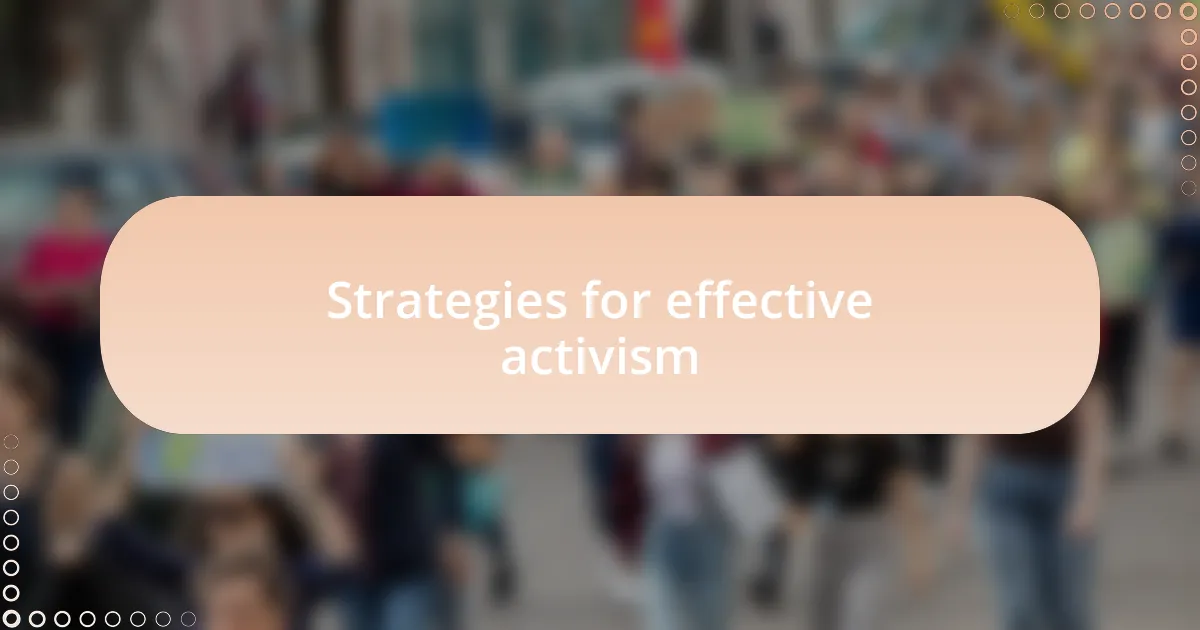
Strategies for effective activism
One effective strategy for activism that I’ve discovered is building coalitions with diverse groups. I once collaborated with environmental activists who were concerned about military pollution. This unexpected partnership broadened our reach and highlighted how different causes intersect, reinforcing the idea that no issue is isolated. Have you ever considered how one cause can amplify another? It’s fascinating to witness how inclusive activism can lead to deeper, more impactful conversations around policy.
Engaging in public demonstrations is another powerful tool. I remember attending a large rally where thousands of passionate individuals united under a common cause. The energy was palpable, and the collective voice sent a clear message to policymakers that we will not stand passively by. Does that sense of community make a difference? From my perspective, it creates a visual and emotional representation of public sentiment that is difficult to ignore and can influence decision-makers significantly.
Lastly, leveraging social media can amplify our message beyond traditional boundaries. In a recent campaign, I used social platforms to share stories and statistics that highlighted the human cost of war. Seeing those posts resonate with people worldwide made me realize the power of digital engagement. Have you explored the potential of social media in your activism? It allows us to connect, engage, and mobilize support across the globe, making our voices louder than ever.
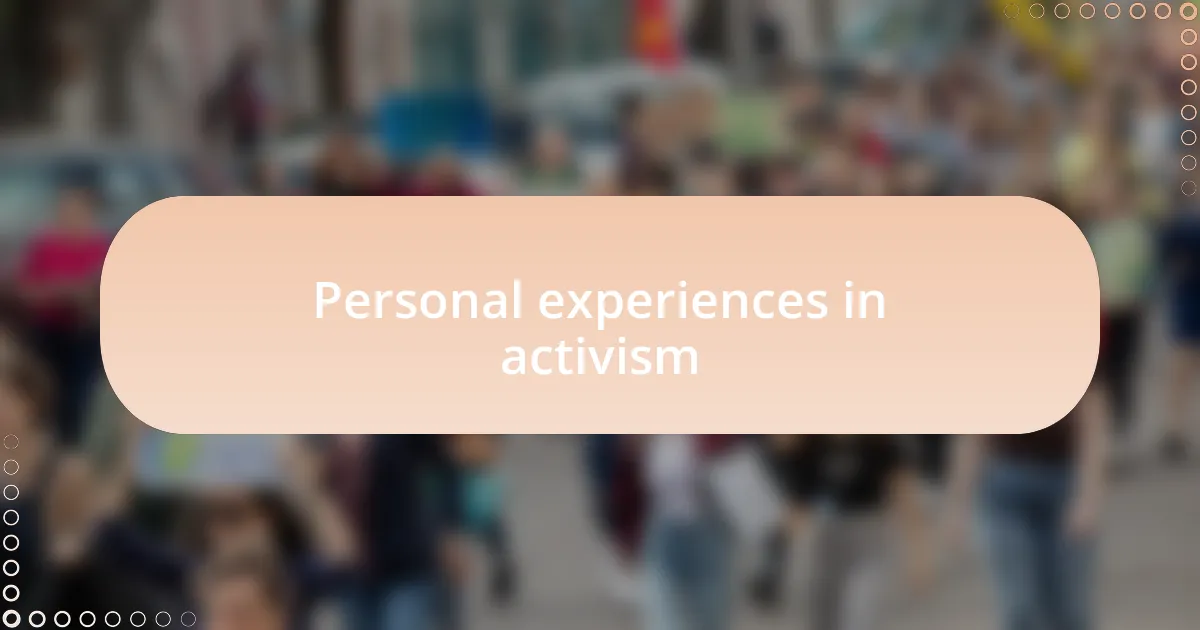
Personal experiences in activism
The personal journey of activism has taught me invaluable lessons. I recall a time when I spoke at a local community meeting, sharing my concerns about the effects of war on marginalized communities. The vulnerability I felt was overwhelming, but witnessing individuals nodding in agreement and sharing their own stories reinforced the idea that our voices are critical in shaping policy. Have you ever found that speaking your truth can connect you to others in unexpected ways?
There was another moment during a peaceful protest where I felt an electrifying sense of solidarity. Standing shoulder to shoulder with strangers, each holding signs and chanting for peace, was a transformative experience. I realized that while we came from different backgrounds, our shared vision united us in a powerful way. It got me thinking—what if more movements embraced this diversity? The emotional strength that arises from such unity often ignites a drive for change that individual efforts might lack.
In my personal activism, I’ve also experienced the harsh reality of pushback. After sending a letter to my representatives expressing my opposition to military spending, I was met with indifference and silence. It was disheartening, yet it made me more determined. I wondered, how can we turn that frustration into fuel for change? For me, it galvanized my commitment to engage more actively and creatively, reminding me that every setback is just a stepping stone in the fight for peace.
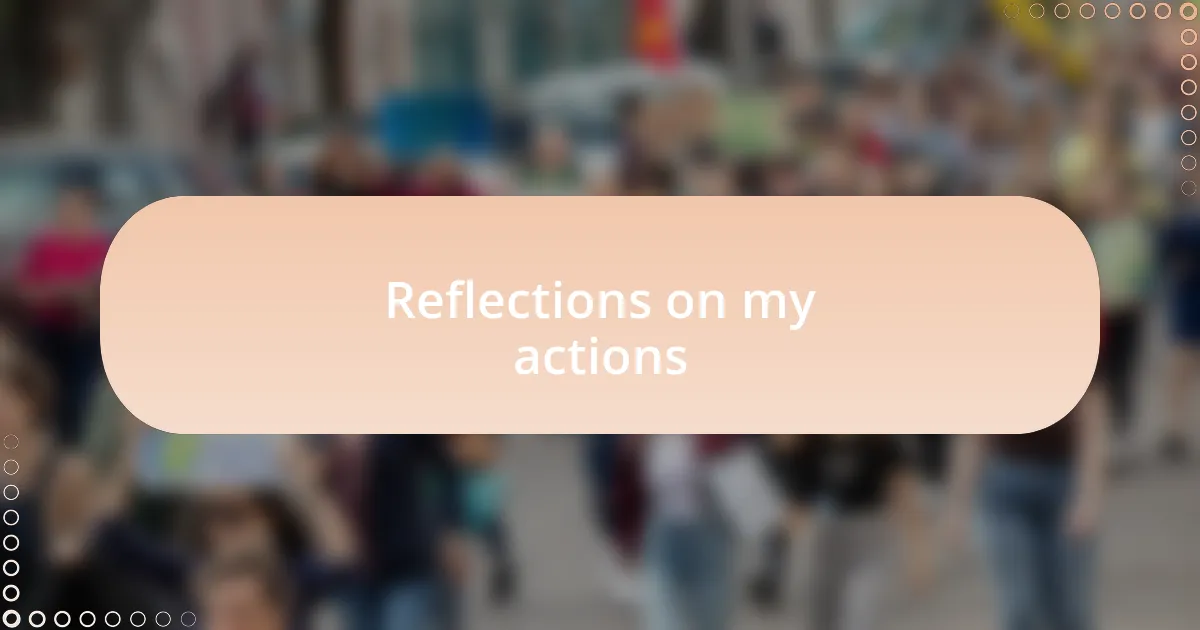
Reflections on my actions
Reflecting on my actions often brings to light moments that challenge my courage. Once, in a small gathering, I hesitated to share my perspective on military intervention, worrying about the reactions I might evoke. But as I finally spoke, a wave of relief washed over me; I realized the importance of being genuine. Have you ever found that those moments of vulnerability can inspire others to speak up, too?
There was an instance where I organized a letter-writing campaign to advocate for peaceful resolutions. As I sat at my kitchen table, drafting my message, I felt both excitement and fear; would my words matter? When I finally sent those letters, it hit me how empowering it is to take action, even when the outcome is uncertain. I often wonder—what potential ripples can our actions create in the vast sea of activism?
Another reflection that resonates deeply with me is the day I watched a documentary on the impact of war. The emotion surged through me, igniting a fierce determination to amplify the stories of those who suffer the most. It left me pondering the responsibility that comes with awareness. If we fail to act, are we not complicit in the silence that perpetuates violence? This realization drives me to continue seeking ways to share knowledge and inspire change within my community.
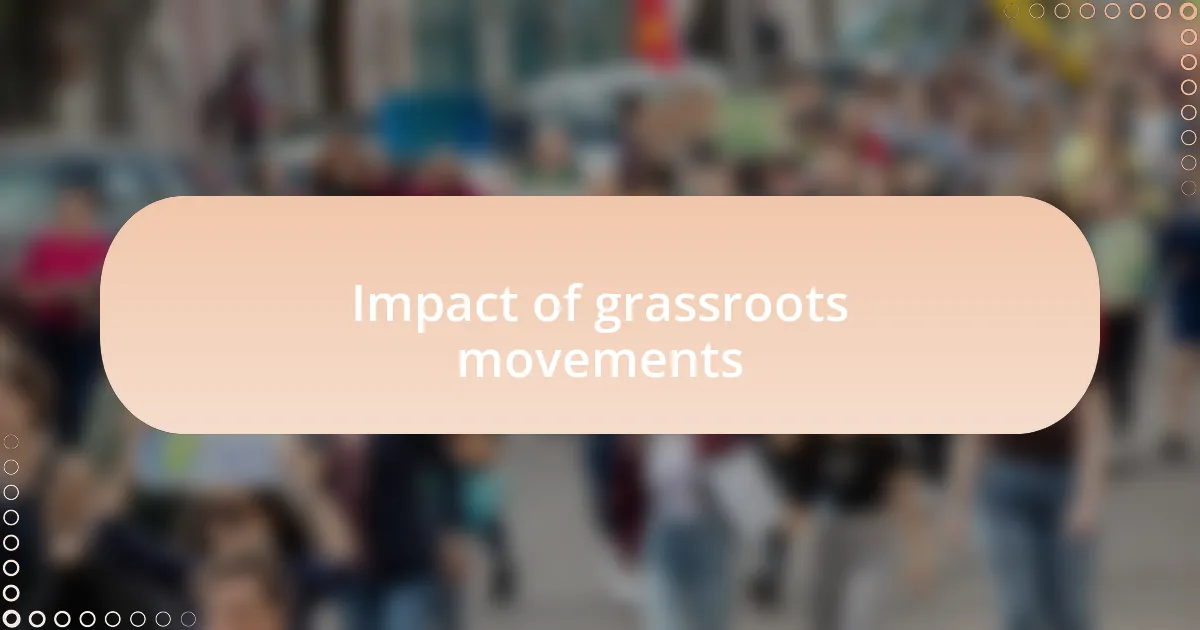
Impact of grassroots movements
Grassroots movements have an undeniable power to influence public policy and shift cultural narratives. I remember attending a local rally where passionate voices came together, all united by a common goal—peace. The energy in the air was electric, and witnessing firsthand how collective action can bring diverse communities together made me reflect on the strength we possess when we stand united. Have you ever felt that sense of belonging, knowing you’re part of something bigger than yourself?
One striking example of grassroots impact that I encountered was in my own neighborhood. A small group of activists organized a community forum to discuss the repercussions of military spending on local resources. I was moved by the stories shared, as they highlighted the often-overlooked consequences of war on our families and education systems. It struck me that when people become informed and engaged, they can drive real change, and I often wonder—what would happen if every community harnessed that level of awareness?
Additionally, I clearly recall a moment when we petitioned the city council to stop funding a military recruitment center in our area. I watched as people from all walks of life joined forces to voice their opposition. The determination was palpable, and it reinforced for me that grassroots activism can create tangible shifts in policy. It left me questioning—how many lives could we impact if we kept pushing for our beliefs with such fervor?
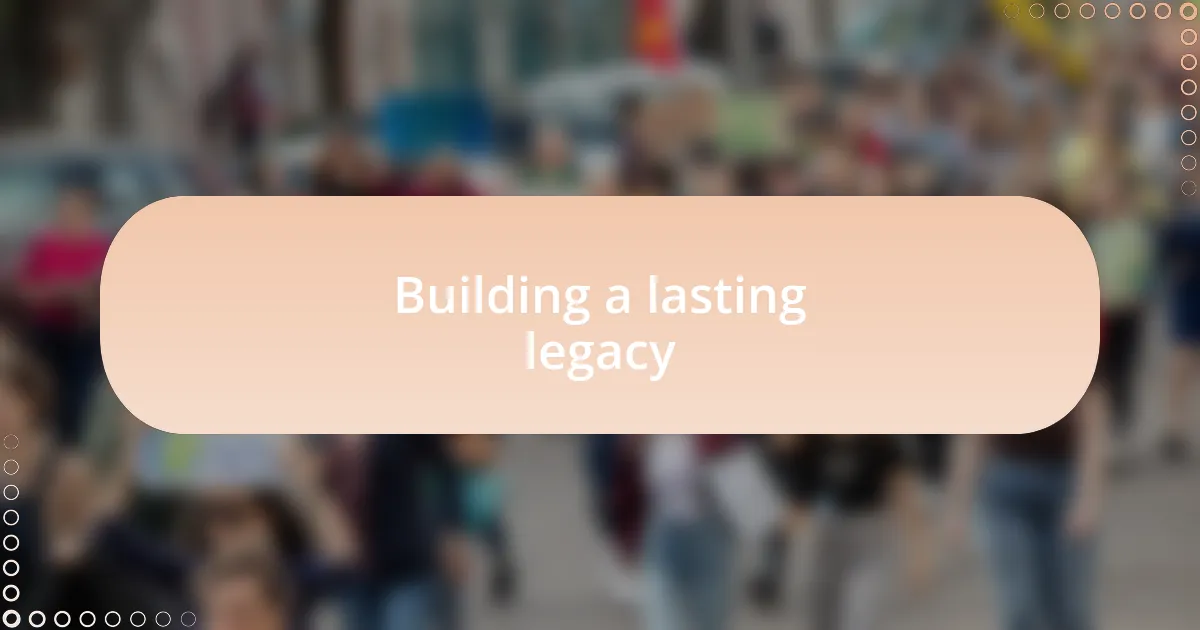
Building a lasting legacy
Building a lasting legacy often stems from the seeds planted by those who are courageous enough to challenge the status quo. I vividly recall a day spent volunteering with a coalition advocating for veterans’ rights; their commitment to change resonated with me deeply. It wasn’t just about addressing immediate issues; it was about nurturing a supportive environment where future generations could feel empowered to speak out against war and its aftermath. How can we ensure that our efforts today create ripples for tomorrow?
One impactful experience was attending a memorial event for civilian casualties in conflict zones. The stories shared were heartbreaking yet powerful, illuminating the human cost often overlooked in policy discussions. I noticed how honoring these lives ignited a shared purpose among attendees, reinforcing the idea that our actions today can shape narratives for years to come. It made me think—what if we could inspire others to carry forward this message of peace, turning our pain into a catalyst for change?
Reflecting on these moments has shown me that building a legacy is less about what we achieve individually and more about how we empower one another. In a recent discussion with a young activist, I found myself energized as we brainstormed ways to cultivate leadership in our community. It struck me how mentorship could create a new wave of advocates, ensuring that the anti-war message continues to thrive. Isn’t it our responsibility to pass the torch and instill a sense of hope in those who will follow?